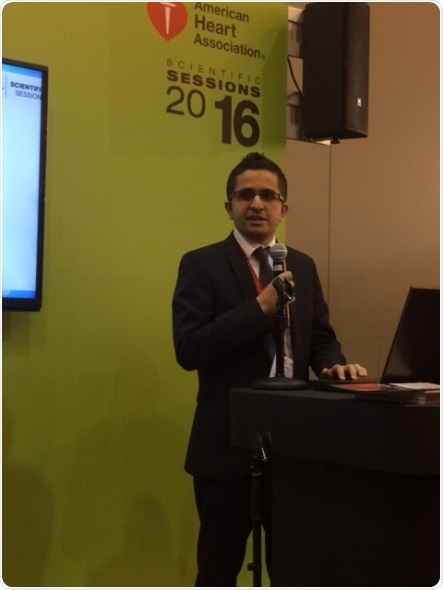The Government has “got it wrong” when it comes to listening to the recommendations of its National Screening Committee regarding the implementation of a UK cardiac screening programme for your young people. That’s the verdict of the leading charity, Cardiac Risk in the Young (CRY) that claims NSC reviews are based on flawed data and lack of access to new research.

CRY Research Fellow Dr Harshil Dhutia presenting his research at the AHA Scientific Sessions 2016
Supporting its calls for greater access to a cost-effective and life-saving service, important new data analysed by researchers from CRY has just been presented at the American Heart Association (AHA) Scientific Sessions (November 2016), adding further weight to the argument that proactive cardiac screening must be offered to all young people whether elite athletes, grass-roots players or the general population.
In the largest ever study of non-competitive athletes (challenging the common misconception that elite athletes alone are at risk of young sudden cardiac death) around 30,000 young people were screened across a 4-year period using an ECG (electrocardiogram) test as well as the standard practice of taking an in-depth clinical history and physical examination.
Of this cohort, 87 conditions associated with young sudden cardiac death were positively diagnosed, equating to a prevalence of 0.3%, which is comparable to rates seen in other studies among athletes. 72 of these conditions (83%) were diagnosed by ECG alone in asymptomatic young individuals who would otherwise remain undiagnosed.
Furthermore, since these young people were tested, new and refined screening criteria developed by the team of researchers based at St George’s University, London has recently received worldwide recognition in peer-reviewed journals.
Previous studies (September 2016) showed that current screening protocols significantly reduced the level of “false positives” (often used by Government advisors as an argument against screening) from 21.8% to 4.3%.
This subsequent reduction in unnecessary follow-up tests resulted in a staggering cut in the overall cost of accurate heart screening, of at least 20%.
Every week, 12 apparently fit and healthy young (aged 35 and under) people in the UK die from a previously undiagnosed heart condition. In 80% of cases, there will have been no signs or symptoms, which is why CRY believes proactive screening is so vitally important – now testing over 23,000 young people every year through its subsidised programme.
Sport itself does not cause young sudden cardiac death but it can exacerbate an underlying condition, if not identified.
Dr Steven Cox, Chief Executive of CRY said:
This study – the first of its kind – is really demonstrating to the medical community that contemporary ECG interpretation criteria brings down the cost of screening young people.
Importantly, it also underlines the vital role of the ECG test – whether for screening or diagnostic purposes – to detect underlying cardiovascular conditions that can increase the risk for sudden cardiac death.
Since CRY was founded in 1995 CRY has tested over 100,000 young people, resulting in 100s of potentially life-threatening conditions being identified.
However, currently, the National Screening Committee has rejected calls to recommend the roll out of a cardiac screening programme across the UK, stating; “Anyone who has had palpitations, breathlessness or is related to someone who has died before 50 of unknown causes should see their GP for a personal check.”
But, lead researcher, Dr Harshil Dhutia, explains:
This study will have very important implications for UK health policy regarding sudden cardiac death in young individuals, demonstrating that screening with ECG is affordable and accurate.
He adds:
This research also shows that cardiac investigation driven purely by symptoms and family history (the approach currently recommended by the National Screening Committee) is associated with a lower diagnostic yield and paradoxically higher cost compared to screening with the routine inclusion of an ECG. I therefore echo CRY’s calls to the National Screening Committee to take these findings into consideration at its next appraisal and recommend screening with ECG for all young people as well as competitive athletes.
CRY screening programme’s is supervised at no cost by Professor Sanjay Sharma, CRY's Consultant Cardiologist. Prof Sharma is the leading Sports Cardiologist in the UK and recognised as one of the leading experts for young sudden cardiac death worldwide.
Chief Executive of the charity Cardiac Risk in the Young, Dr Steven Cox, concludes:
Through our pioneering screening programme, CRY’s research teams have unrivalled access to clinical data that is allowing us to further our understanding of the causes of young sudden cardiac death in both athletes and the general population as well as developing the most accurate and cost-effective way of identifying these potentially fatal and often preventable conditions.
There is no doubt that the UK Screening Committee needs to sit up and take notice NOW and stop brushing the importance – and validity – of cardiac screening for young people under the carpet.